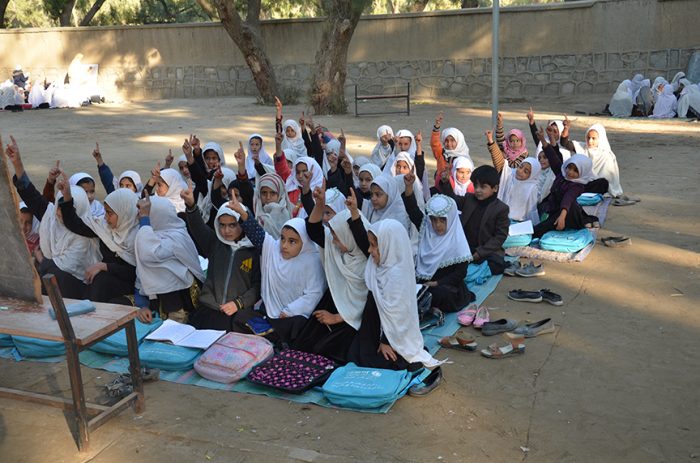Improving school facilities to maintain students’ enrollment and reduce absenteeism
Despite the recent success of increased enrolment in schools in Afghanistan, completing even elementary level education remains a faraway goal for many children, particularly girls, in rural parts of the country[1]. Due to limited financial support, government schools in Afghanistan lack the necessary resources for a fully functional school, such as sufficient teachers or teaching material. The deteriorating school conditions and poor education quality are leaving students demotivated and increasing absenteeism. To fill these gaps and address some of these issues, Community World Service Asia, Presbyterian World Service & Development and Act for Peace, with the support of local partners, initiated a Girls’ Education Project. The project aims to improve educational quality of government schools by providing resources and introducing innovative teaching techniques focused on child-centered methods.
“It was very difficult to keep the students attentive and engaged in studies. They would quickly become bored and refuse to attend school the next day. The students’ outcomes were also unsatisfactory. Our lecture-style teaching was ineffective, and our harsh demeanour towards pupils alienated them from us. Because the school lacked carpets or plastic sheets to sit on, students were forced to sit on the damp grounds. I felt guilty whenever a student called in ill because the school facilities were unsanitary,” shared Zarghona, a Grade 2 teacher at Qala-e-Akhund school, which is one of the schools targeted under the project in Nangarhar.
Between October 2020 to July 2021, a total of 28 elementary schools have been provided with school stationery on a monthly basis under the project. Chart papers, white and coloured sheets, flash cards, chalk, makers, and white and black boards were among the stationery items. “In January 2021, the project team delivered plastic rugs that allowed our children to sit comfortably on a clean surface. Furthermore, the stationary materials enabled us to involve students more actively in practical work and group activities. We used low-cost materials to engage children in interesting exercises utilising flash cards and flip charts to solve arithmetic problems and conduct scientific experiments. We can now see how students enjoy learning new things every day in school. I have become more approachable to my students. They ask more questions and express themselves without fear or reluctance.”
In May this year, local schools organised a student’s competition based on Maths and Islamiat. Girls students representing Qala-e-Akhund won the competition. Hasibullah Shinwari, the Director of Education – Nangarhar, who was honorary guest at the occasion, praised and congratulated the girls for their enthusiastic involvement and their display of knowledge in the competition.
“On May 19, Hasibullah Shinwari presented our school with an appreciation letter and commended our teaching methods and student motivation level. It was a memorable day for us since our efforts had paid off, and we were seeing our students receive commendations from a higher official. As a teacher, I aim to make education popular in Afghanistan through my efforts, and hope to see every girl in school one day,” Zarghona said.







